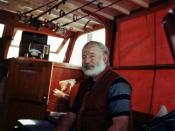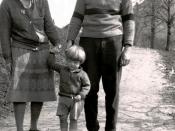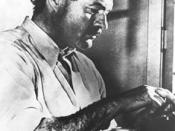Bergische Universität Wuppertal
Englisches Seminar
Seminar: American Modernism
Dozent: Dr. Michael Butter
Bahar Yildirim
Sunday, March 23, 2014
Seminararbeit
Hemingway`s Iceberg Theory in "Hills Like White Elephants"
Im Rahmen des Seminars
American Modernism
WS 2013/2014
Bahar Yildirim
Matrikelnummer: 831655
Studiengang: Angelistik & Wirtschaftswissenschaften KombiBa 2010
Emailadresse: 831655@uni-wuppertal.de
Table of Contents
1. Introductionâ¦â¦â¦â¦â¦â¦â¦â¦â¦â¦â¦â¦â¦â¦â¦â¦â¦â¦â¦â¦â¦â¦â¦â¦â¦â¦â¦â¦â¦â¦â¦â¦â¦â¦â¦â¦â¦â¦â¦â¦...3
2. The Iceberg Theoryâ¦â¦â¦â¦â¦â¦â¦â¦â¦â¦â¦â¦â¦..â¦â¦â¦â¦â¦â¦â¦â¦â¦â¦â¦â¦â¦â¦â¦â¦â¦.....â¦â¦â¦â¦â¦3
3. The Narrative Situationâ¦â¦â¦â¦â¦â¦â¦â¦â¦â¦â¦â¦â¦â¦..â¦â¦â¦â¦â¦â¦â¦â¦â¦â¦â¦â¦â¦â¦â¦â¦â¦â¦..â¦..6
4.Symbolisms and Imageryâ¦â¦â¦â¦â¦â¦.....â¦â¦â¦â¦â¦â¦â¦â¦â¦â¦â¦â¦â¦...â¦â¦â¦â¦â¦â¦â¦â¦.â¦â¦â¦..â¦7
5. Conclusionâ¦â¦â¦â¦â¦â¦â¦â¦â¦â¦â¦â¦â¦â¦â¦â¦â¦â¦â¦â¦â¦â¦â¦â¦â¦â¦â¦â¦â¦..â¦â¦â¦â¦â¦â¦â¦...â¦â¦...â¦12
6. Works Citedâ¦â¦â¦â¦â¦â¦â¦â¦â¦â¦â¦â¦â¦â¦â¦â¦â¦â¦â¦â¦â¦â¦â¦â¦â¦â¦..â¦â¦â¦â¦â¦â¦â¦â¦â¦â¦â¦â¦â¦...13
Introduction
"If a writer of prose knows enough about what he is writing about he may omit things that he knows and the reader, if the writer is writing truly enough, will have a feeling of those things as strongly as though the writer had stated them. The dignity of movement of an iceberg is due to only one-eight of it being above water. A writer who omits things because he does not know them only makes hollow places in his writing" (Oliver 322).
Ernest Hemingway is noted as one of the greatest American writers in literature with his unique writing style. His famous iceberg theory, also known as the theory of omission" had a great influence on many writers of the 20th century. His adoption of the iceberg technique can be related to his career as a journalist. As a newspaper author he had little choice but to write in a concise, straightforward and minimalistic style which he later on adopted and transmitted into his fiction. His primary concern was to report news and to give the reader as vivid and colorful picture as possible. To achieve this he used a certain technique, which Hemingway felt would be "detrimental to a prose whose foremost aim was to make the reader feel as if everything has happened to him" (Giger 26)
I will show in my analysis that...


